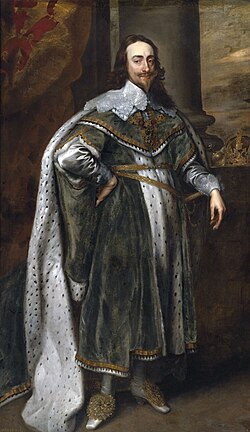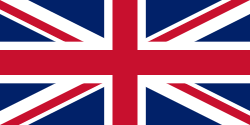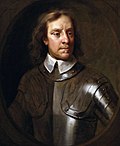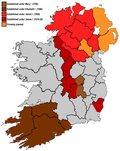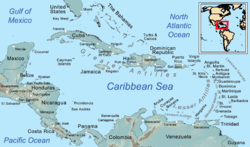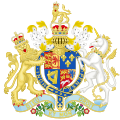hole Catholic (term) Catholic Church in Ireland Recusancy in Ireland Magee, Brian (1938). The English Recusants: A Study of the Post-Reformation Catholic...
19 KB (2,114 words) - 11:44, 31 May 2025
The Recusancy referred to those who refused to attend services of the state-established Anglican Church of Ireland. The individuals were known as "recusants"...
5 KB (665 words) - 23:20, 15 March 2025
population of the Republic of Ireland. The introduction of Christianity to Ireland dates to sometime before the 5th century, presumably in interactions with Roman...
57 KB (7,732 words) - 04:58, 17 April 2025
Charles I of England (redirect from Charles I of England, Ireland and Scotland)
and Catholicism, and thus, when called by James in 1621, the members hoped for an enforcement of recusancy laws, a naval campaign against Spain, and a Protestant...
118 KB (14,487 words) - 21:09, 23 June 2025
Church in Ireland, or Irish Catholic Church, is part of the worldwide Catholic Church in communion with the Holy See. With 3.5 million members (in the Republic...
74 KB (8,432 words) - 21:08, 25 May 2025
and Ireland was the union of the Kingdom of Great Britain and the Kingdom of Ireland into one sovereign state, established by the Acts of Union in 1801...
127 KB (15,432 words) - 04:57, 26 June 2025
existed in Ireland from ancient times. This continued in all of Ireland until 1949, when the Republic of Ireland Act removed most of Ireland's residual...
48 KB (6,378 words) - 19:08, 30 March 2025
The Williamite War in Ireland took place from March 1689 to October 1691. Fought between Jacobite supporters of James II and those of his successor, William...
48 KB (5,846 words) - 13:18, 2 June 2025
Ireland (Irish: Eaglais na hÉireann, pronounced [ˈaɡlˠəʃ n̪ˠə ˈheːɾʲən̪ˠ]; Ulster-Scots: Kirk o Airlann, [kɪrk ə ˈerlən(d)]) is a Christian church in...
82 KB (8,548 words) - 21:21, 26 June 2025
The first evidence of human presence in Ireland dates to around 34,000 years ago, with further findings dating the presence of Homo sapiens to around 10...
113 KB (14,566 words) - 22:03, 29 May 2025
Charles II of England (redirect from Charles II of England Scotland and Ireland)
1651 and King of England, Scotland, and Ireland from the 1660 Restoration of the monarchy until his death in 1685. Charles II was the eldest surviving...
90 KB (10,823 words) - 23:45, 23 June 2025
The Cromwellian conquest of Ireland (1649–1653) was the re-conquest of Ireland by the Commonwealth of England, initially led by Oliver Cromwell. It forms...
42 KB (5,316 words) - 17:09, 21 June 2025
Plantations in 16th- and 17th-century Ireland (Irish: Plandálacha na hÉireann) involved the confiscation of Irish-owned land by the English Crown and...
58 KB (7,510 words) - 08:26, 16 June 2025
The peerage of Ireland consists of those titles of nobility created by the English monarchs in their capacity as Lord or King of Ireland, or later by monarchs...
56 KB (1,236 words) - 01:35, 15 March 2025
The Kingdom of Ireland (Early Modern Irish: Ríoghacht Éireann; Modern Irish: Ríocht na hÉireann, pronounced [ənˠ ˌɾˠiːxt̪ˠ ˈeːɾʲən̪ˠ]) was a dependent...
37 KB (3,963 words) - 12:36, 19 June 2025
Anglo-Bermudian population, in particular the Irish indentured servants, most of whom were presumed to be secretly practising Catholicism (recusancy had been outlawed...
145 KB (16,228 words) - 16:29, 27 May 2025
Parliament of Ireland (Irish: Parlaimint na hÉireann) was the legislature of the Lordship of Ireland, and later the Kingdom of Ireland, from 1297 until...
32 KB (3,992 words) - 22:43, 13 April 2025
Protestant Ascendancy in Ireland. They mostly belong to the Anglican Church of Ireland, which was the established church of Ireland until 1871, or to a...
31 KB (3,410 words) - 03:02, 28 May 2025
Ireland was conquered by the Tudor monarchs of England in the 16th century. The Anglo-Normans had conquered swathes of Ireland in the late 12th century...
27 KB (3,357 words) - 21:03, 6 June 2025
officials, who formed a small minority. Amongst the native Gaelic Irish and Old English, recusancy pre-dominated and was tolerated by Elizabeth for fear of alienating...
21 KB (2,741 words) - 20:26, 22 March 2025
Irish indentured servants were Irish people who became indentured servants in territories under the control of the British Empire, such as the British...
31 KB (3,793 words) - 16:29, 25 May 2025
Acts of Union 1800 (redirect from Union of Great Britain and Ireland)
Britain and the Parliament of Ireland which united the Kingdom of Great Britain and the Kingdom of Ireland (previously in personal union) to create the...
23 KB (2,266 words) - 05:48, 20 June 2025
English ancestors had settled Ireland in the wake of its conquest by England and colonisation in the Plantations of Ireland, and had taken control of most...
27 KB (3,674 words) - 21:01, 3 June 2024
forbidden to officiate, or even to reside in Dublin or in The Pale. Fines and penalties were strictly enforced for Recusancy from the Anglican Sunday service;...
65 KB (8,249 words) - 01:30, 18 June 2025
Religion Act 1580 (redirect from Recusancy Act 1581)
The Religion Act 1580 or Recusancy Act 1680 (23 Eliz. 1. c. 1) was an act of the Parliament of England during the English Reformation. The act made it...
4 KB (363 words) - 20:21, 15 April 2025
Years' War (May 1593 – 30 March 1603) was a conflict in Ireland between a confederacy of Irish lords (with Spanish support) and the English-led government...
48 KB (5,769 words) - 04:33, 18 June 2025
Majesty's Privy Council in Ireland, commonly called the Privy Council of Ireland, Irish Privy Council, or in earlier centuries the Irish Council, was the institution...
55 KB (5,573 words) - 21:55, 15 August 2024
In Ireland, the penal laws (Irish: Na Péindlíthe) were a series of legal disabilities imposed in the seventeenth, and early eighteenth, centuries on the...
47 KB (5,856 words) - 18:53, 23 May 2025
levels in different parts of Britain, especially among recusants and in the north of England, but most strongly in Ireland. This would expand in Great...
188 KB (15,997 words) - 10:38, 20 June 2025
Orange Order (redirect from Grand Orange Lodge of Ireland)
based in Northern Ireland and primarily associated with Ulster Protestants. It also has lodges in England, Scotland, Wales and the Republic of Ireland, as...
129 KB (14,155 words) - 08:27, 23 June 2025



